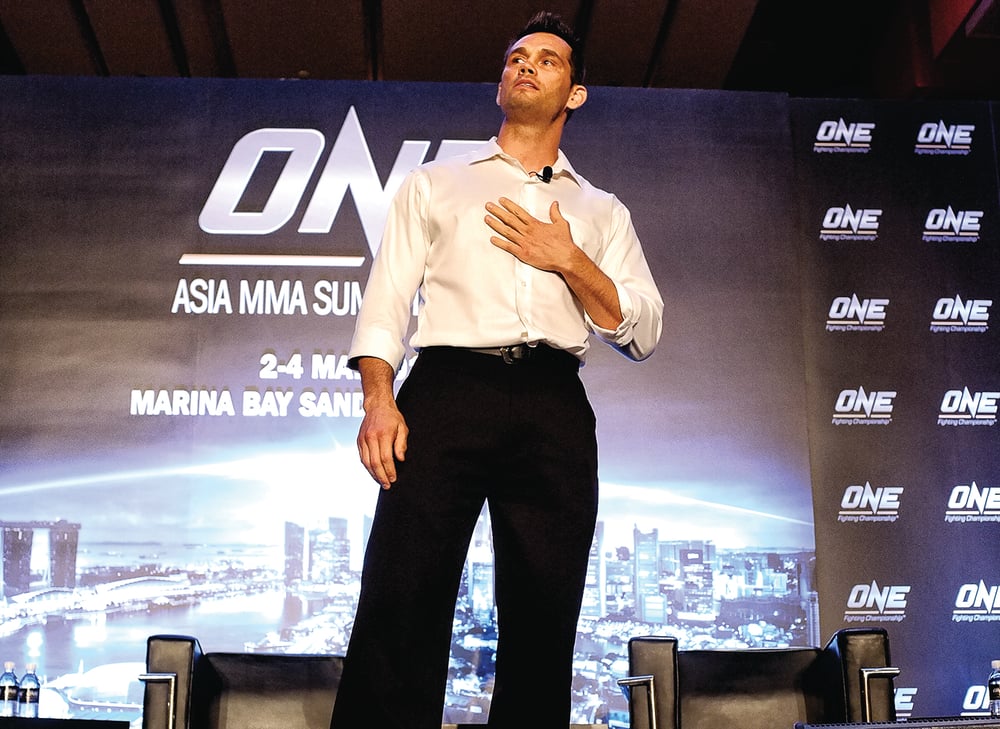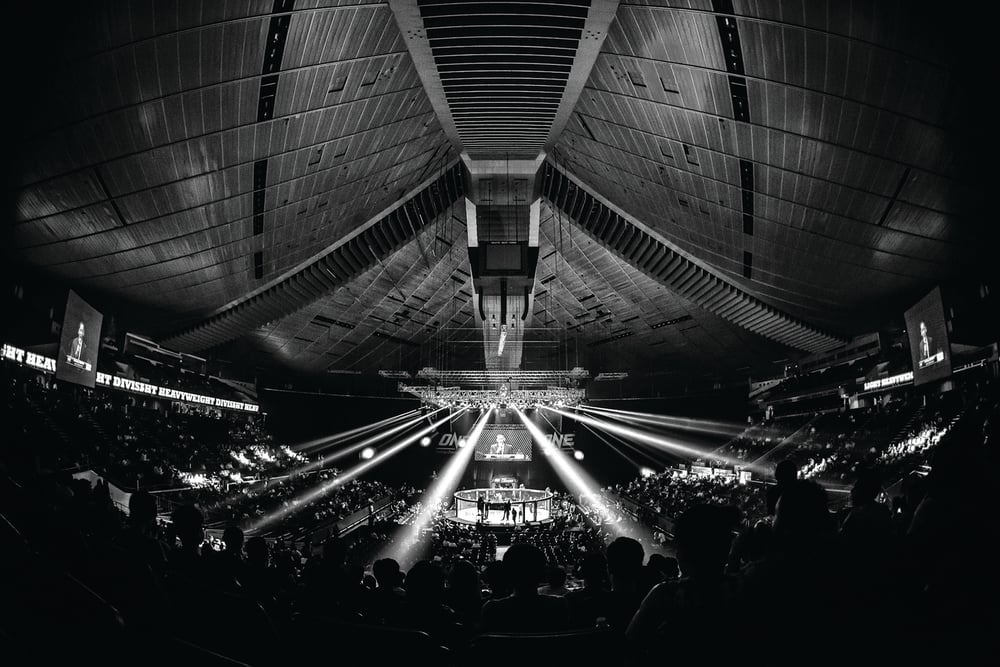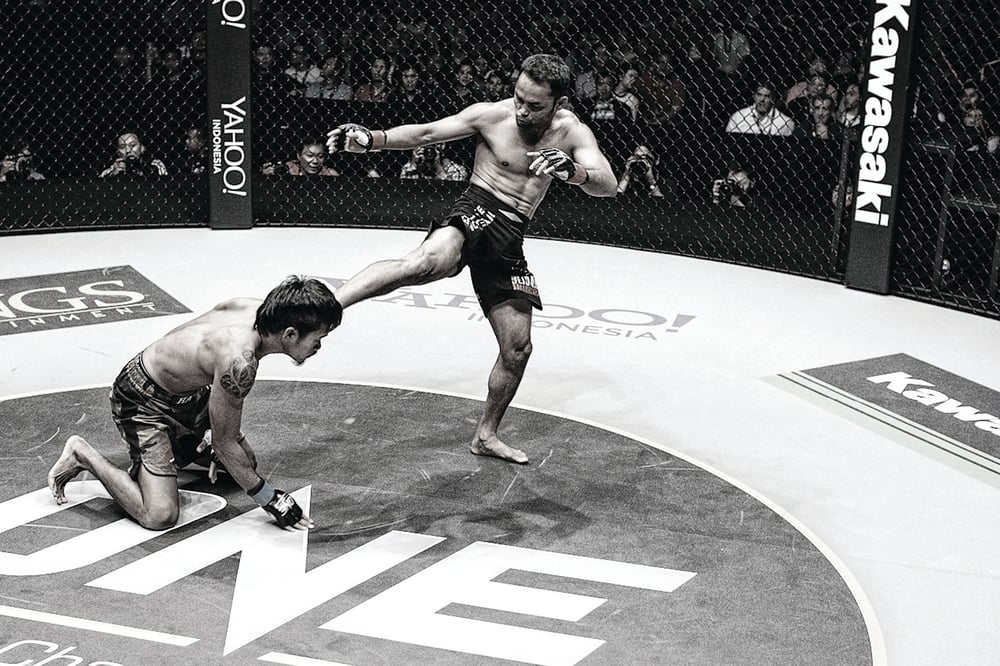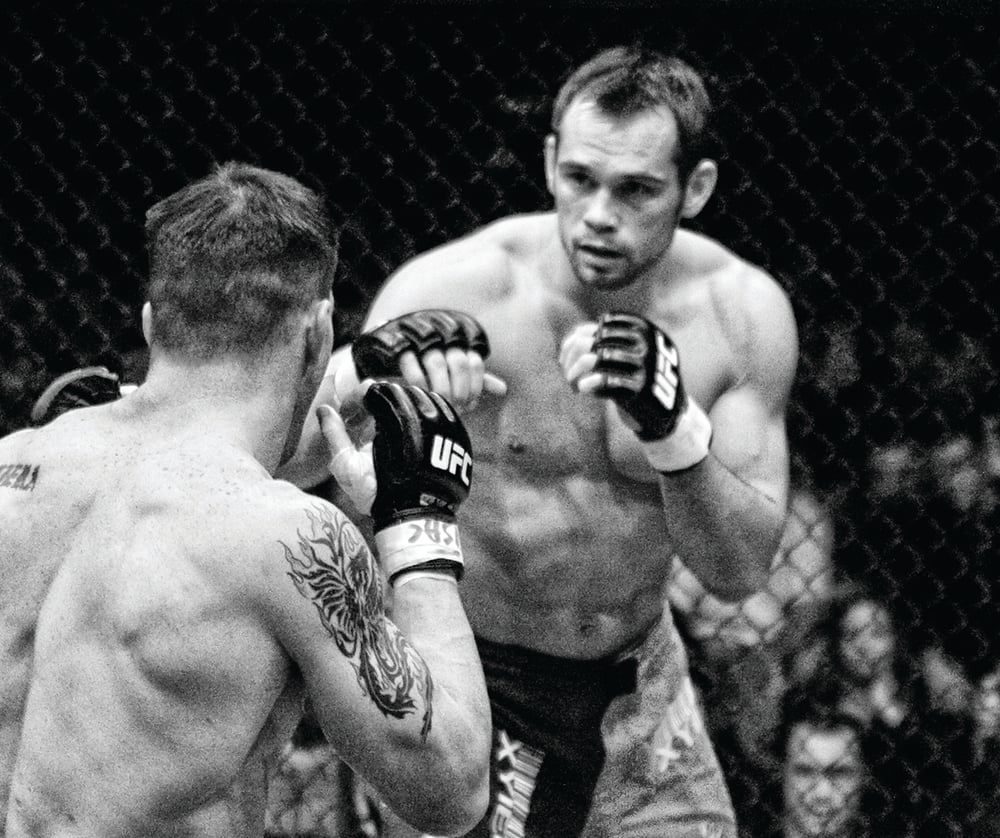
Issue 137
January 2016
Rich Franklin’s fighting career may be over, but as VP of One Championship he’s eager to play a far bigger role in MMA’s future
Leading Man
FO heads off the mats with MMA’s most powerful coaches, executives and personalities
Rich Franklin
One championship VP
After deliberating long and hard about calling time on a MMA career that’s likely assured him a spot in the UFC Hall of Fame, former middleweight champion Rich Franklin has hung up his gloves for good. But ‘Ace’ is not done with mixed martial arts and he’s certainly not ‘retired.’ The vice president of the Singapore-based One Championship tells FO how gambling a college education on a fighting life was the best decision he ever made.

Q. In August you said you wanted one more fight, but you announced the end of your career in September. Why the change of heart?
A. You just wake up one day and the realization kind of hits you – it’s just time. It was always my objective to fulfill my (UFC) contract, just for no other reason than I wanted to fulfill my contract. But as time drifted on I went from thinking, ‘I’m definitely fulfilling my contract,’ to, ‘Yeah, it’s going to be quite difficult to do this and keep up the responsibilities I have with One Championship.’
Q. Did you still have the desire to compete?
A. There’s a thin line when you talk about this kind of stuff because I don’t want to paint the picture that I’m not ready to move on because I’ve got to a point where I’m excited about the next phase of my life. That’s why my ‘retirement announcement’ wasn’t necessarily a retirement announcement as much as I was opening a new chapter in my life.
Q. Did you still have the desire to compete?
A. There’s a thin line when you talk about this kind of stuff because I don’t want to paint the picture that I’m not ready to move on because I’ve got to a point where I’m excited about the next phase of my life. That’s why my ‘retirement announcement’ wasn’t necessarily a retirement announcement as much as I was opening a new chapter in my life.
Q, What was the highlight of your career?
A. I came into this sport when it wasn’t accepted and I remember the day when I told my dad I wanted to quit my job as a teacher. In his mind I basically threw away my entire college education. I was the only college-educated kid my father had. He wanted to hit me. Fast forward and I was having dinner with him the week of my fight when I defended my title for the first time. He said he was really proud of me. There’s no title, no belt, no moment in time that can replace those kinds of moments in my life. They are my highlights… And now I’m vice president of an international company, so I guess that college education counted for something!

Q. You were always seen as a UFC company guy, so how did you end up working for the biggest promotion in Asia?
A. I came down to Singapore several years ago to do a seminar and met some of the people who were involved with One Championship. Several years later they reached out about them wanting to hire me and so I sat down with (the UFC) to see what they had available, bearing in mind I wasn’t interested in some kind of BS position. They didn’t have anything so I explained the One Championship offer to Dana (White, UFC president) and Lorenzo (Fertitta, UFC chairman and CEO) and they said, ‘This sounds like a good job opportunity and we don’t have anything for you like that, so perhaps this is something you should pursue.’
Q. What does being vice president for One Championship involve?
A. I know some of the growing pains and mistakes that other organizations have made, so one of the biggest assets I bring is my experience in this industry. When we go into a new territory I might meet with sports ministries or their version of the athletic commissions to talk to them and educate them about mixed martial arts, or conduct seminars with local athletes. I sometimes work with fighter development within the organization because it’s a natural transition with my background. I come from the athletic side of things and now I’m working outside of the cage.
Q. Why has One Championship been so successful?
A. We have amazing production values and our shows are great to watch, especially considering One Championship is only a four-year-old company. On a global scale we’re often compared to companies like the UFC. Matt Hume (One VP of operations) does an amazing job with matchmaking – our fights are very entertaining.

Q. Which fighters have you been most impressed by?
A. You look at some of the champions like our Mongolian champion, Jadamba Narantungalag. Sometimes I watch these fighters and it’s amazing how they’re able to adapt their standup skills to MMA so quickly. Take our strawweight champion Dejdamrong Sor Amnuaysirichoke as an example. ‘Kru Rong,’ as we call him, was a strict Muay Thai champion. I watch him train in the gym or I see him work and he’s able to take his Muay Thai skills and adapt them (for MMA).
These Thai guys naturally transition well to wrestling because they have great takedown defense and their takedowns are pretty good, they use sweeps and knock people off-balance. Kru Rong is a guy who’s learned quite a lot of jiu-jitsu skills and has actually submitted a few of his opponents. He’s transitioned really well.
Q. What are the challenges of promoting MMA in Asia?
A. Although martial arts are ingrained in pretty much any Asian culture, mixed martial arts is completely different to whatever they’re used to. We’re in the developmental stages of building the entire infrastructure of MMA, so we have some work ahead of us.
If you look at the history of MMA – it grew in the US and it moved from one state athletic commission to the next. We were basically repeating that process over and over. But here we do a show in Singapore and then we go to Indonesia and it’s a completely different set of rules. Then you jump to a place like Thailand and it’s completely different again.
In China, every city is like a different country. Often, though the language is the same, the local laws, regulations and the people you have to deal with changes from region to region dramatically.
Q. How big do you think One Championship can be?
A. Take Indonesia, where the population is almost the same size as the United States – that’s just one territory we’re in. We’ll eventually make our way from the Middle East, to Europe and look at crossing over to the West. When you just look at the pure numbers, even if we just stayed on this side of the world, I wouldn’t even know where to start with our potential. People asked me this question about MMA in the States years ago and I way underestimated what I thought the ceiling was. I believe that’s going to be the case in Asia too.

Back in the day
Q. Do you look at MMA now and wish you could have fought in the modern era?
A. I’m really grateful for the time I was in the sport when it had to make a name for itself. I was a high school math teacher who decided to quit his job and do this sport that John McCain called human cockfighting.
I see endorsement deals and bigger money now than 10 years ago. That didn’t exist at the time I was fighting. Companies didn’t want to attach themselves to something like MMA. Part of me thinks, ‘Man, I’m kind of missing out.’ But I was in this sport at a time when it was a big deal to see a pay-per-view.
It was a big deal when there was a Rich Franklin fight on TV. Now there are so many fights it’s difficult for me to keep up – and I work in this industry. There are pluses and minuses for both eras, but ultimately I just consider myself blessed to have experienced what I experienced.
Leading man
Q. What’s One Championship CEO Victor Cui like as a boss?
A. Where would I even start about Victor? I like working with him. He’s really good at motivating his team. He’s basically entrenched in pretty much every major aspect of the organization. He has a finger on the pulse of what’s going on. I’ve never seen somebody maintain a travel schedule like he does. He’s just all over the place because this company is working so diligently on making things move. Every time I sit down with him I feel like a sponge for information on the business side of this industry.
...









